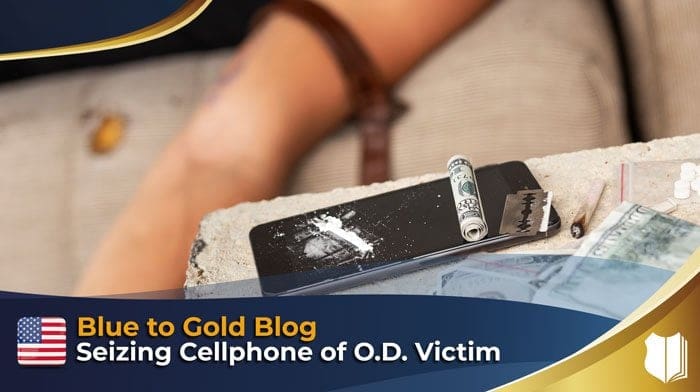Anthony Bandiero here, bringing you another question and answer.
This one is from an officer in New York. The question is, when officers respond to an OD, and the person is revived, can you take their cell phone as evidence?
You want to see who the dealer is, because that’s the person who could potentially be charged for contributing to the overdose. What if the person ends up dying? Can you search or seize any cell phones? Here’s my feedback.
Number one, obviously, without any question, taking a person’s cell phone is a Fourth Amendment issue. It’s a seizure under the Fourth Amendment, especially if they’re alive, because if they’re alive, they have a possessory interest in their cell phone. Therefore, the seizure has to be reasonable.
Now, if the person is being transported to the hospital, and you’re going to conduct a criminal investigation to determine who sold the narcotics to the person, seizing the phone in order to get a warrant is reasonable. You’re going to have probable cause.
But, seizing it as a matter of routine, and then keeping it in the evidence locker and not seeking a search warrant presents a problem. Where do you go from there? First of all, the person can demand their phone back. And if you’re not going to seek a search warrant, then you’re going to have to give their phone back.
If you don’t give the phone back, you might have a lawsuit on your hands. I know it might be kind of minor, but, the attorney is going to say, “Well, you have my client’s property, you’re not releasing it and you’re not seeking a search a search warrant. So you’re de-possessing my client of their property.” That’s a good argument.
So, if you’re going to seize the cell phone, the thing I want to see is that you’re getting that search warrant as soon as possible. But if your department has a policy, or a custom and practice of just routinely seizing people’s cell phones, I see that as problematic. I see that as potentially condoning a violation of some Fourth Amendment rights; that you’re seizing their cell phone unreasonably.
There are not a lot of cases I’ve seen on this, and a lot of it is going to be civil. But I want to see cops diligently seeking a search warrant if they’re going to seize cell phones. Now, if the person has died, we have a criminal investigation. Also, there is usually nobody that has any standing over the phone, because the person that had forthright standing is dead.
Other people, like the dealer, have no standing over the phone. Friends, or the parents that may want the phone back, that’s not going to be their phone. Even if they get the property afterwards, in probate or something, that phone is evidence, and you still want to diligently seek a search warrant. And of course, if the person died, I don’t know why you wouldn’t be.
So actually, I thought was an interesting question. I don’t see a lot of cases on this, but I just want to give you what I’d be looking for. So I do see it as an issue; seizing phones as a matter of routine. I want to see cops diligently going to get those search warrants. Otherwise, we may have a problem.
Thank you for the question, and keep them coming!











